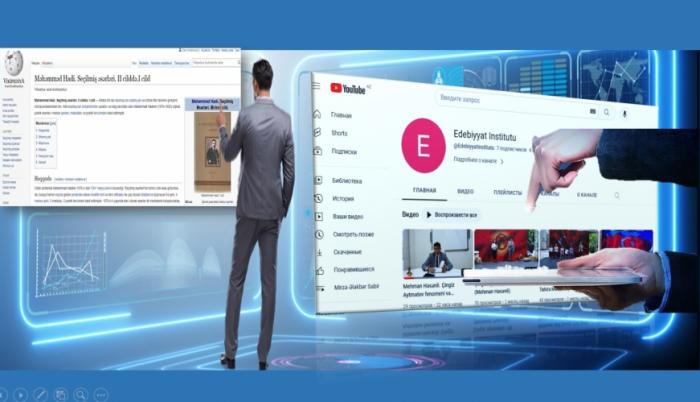
Social networks are interactive platforms for members of the scientific community to exchange ideas, search and bring together groups with similar scientific interests, post creative products and publications, and integrate them into the life of the public. Social networks are actively developing on the Internet, which allows scientists to follow from all over the world and use other opportunities created by technology.
Academician Isa Habibbeyli, President of the Azerbaijan National Academy of Sciences, noted in one of his speeches that "We want to strengthen the position of Azerbaijan in Wikipedia... Our activities are expanding in the direction of opening the academic profiles of our scientists on Google Scholar and other scientific platforms. We are also trying to place our scientific publications on international databases. . We are interested in including the scientific journals of ANAS in the Dargi Park electronic database register of ULAKBIM. In addition, one of our future goals is to include our journals covering humanities and social sciences in international databases. We are working to improve our positions in international scientific rankings, and we are doing all these things together with our brother Turkey. We want to see it. For this, for the first time in the CIS, an Electronic Academy department was established in ANAS for the organization of electronic services." As noted by the respected Academician, significant processes are being continued in the field of expanding the possibilities of electronic science at the Institute of Literature after Nizami Ganjavi.
The social networks of the Nizami Ganjavi Institute of Literature already have digital resources with creative examples of our scientists, Azerbaijani literature, our literary history, the science of literary studies, literary criticism, literary genres, etc. you can read and follow new related materials, increase citations of your blogs, find platforms for discussions or like-minded people.
As we know, social networks contribute to the popularization of ideas and thoughts. If the task of a scientist is to make his research "more visible" to other scientists, then of course social media helps closely with this. In fact, social media designed mainly for scientists (such as LinkedIn, ResearchGate, Academia.edu) are very useful for promoting the results of their research and organizing collaborative work among colleagues.
Activity and viewing statistics on the channels of the Institute of Literature https://www.youtube.com, https://www.facebook.com, https://twitter.com are show that the integrative role of our scientists in social networks is also expanding. Employees of the Institute of Literature have started important processes in introducing the resources of Azerbaijani literature and literary studies to the world at https://az.wikipedia.org. It is also gratifying to see the important results achieved and the interest of each new resource. For example, the presentation of the monograph "Chingiz Aytmatov phenomenon and Azerbaijan" by Mehman Hasanli, executive director of the Institute of Literature, Ph.D. in philology, on the YouTube channel of the Institute is interesting as an original type of digital communication. Or, these days, Seyidnisa Latifli, an employee of the Institute of Literature named after Nizami Ganjavi of ANAS, who participated in the trainings held at the Central Scientific Library under the organization of the "Electronic Academy" department of the Presidium of ANAS, prepared and included new interesting and meaningful articles in the Azerbaijani language section of "Wikipedia". . One of them is an article about "Selected Works. Volume II. Volume I" of our great poet Muhammad Hadi. Our resources in social networks are dedicated to the most diverse literary events, and our scientific activity is diverse and broad in terms of subject matter. Our literary scientists are always ready for the dissemination of scientific knowledge on social networks, the visible and understandable presentation of scientific ideas and considerations, and are always ready for meetings with researchers from all over the world, society in general, and meetings on digital platforms of communication.
Ph.D. Z. Aliyeva
